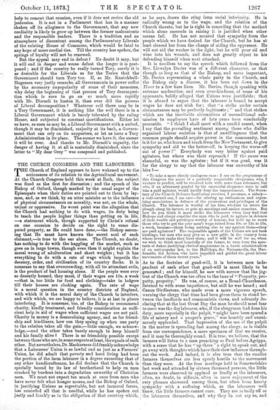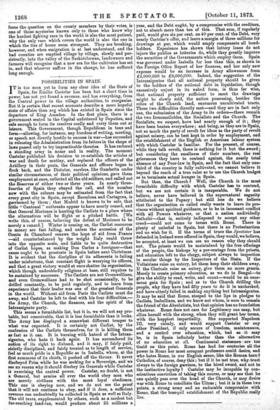THE CHURCH CONGRESS AND THE LABOURERS.
THE Church of England appears to have wakened up to the seriousness of its relation to the Agricultural movement. At the Church Congress held this week at Bath, the subject was fixed as the first for discussion ; and the speech of the Bishop of Oxford, though marked by the usual auger of the Episcopate when their duties are pointed out to them by lay- men, and, as we think, by an utter mistake as to the influence of physical circumstances on morality, was not, on the whole, unjust or oppressive. Its worst point was the allegation that the Church had nothing to do with wages, its duty being to teach the people higher things than getting on in life, —a statement which, though supported by Christ's refusal on one occasion to decide on the right to some dis- puted property, as He could have done,—the Bishop assum- ing that He must have known the secret soul of each claimank—is true to the ear alone. The Church, no doubt, has nothing to do with the haggling of the market, such as goes on in large towns, though even then it might explain the moral wrong of adulteration and short weights ; but it has everything to do with a rate of wage which imperils the decency, order, and civilisation of its country flocks. It is nonsense to say that overcrowding, with all its attendant evils, is the product of bad housing alone. If the people were ever so decently housed, they must, if their wages are 10s. a week —that is, too little for food and clothing—take in lodgers till their houses are choking again. The rate of wage is a moral question in the country districts of England, with which it is the moral duty of the Church to interfere, and with which, we are happy to believe, it is at last in places interfering. It is nonsense, too, of the Bishop to recommend charity, kindly treatment, and friendly consideration as suffi- cient help in aid of wages when sufficient wages are not paid. Charity in money is a demoralising agency, and as for friend- ship and kindliness, how can they spring up when one party to the relation takes all the gain,—little enough, we acknow- ledge,—and the other takes barely enough to keep himself and his family alive ? There is no friendship possible except between those who are, in some respects at least, the equals of each other. But nevertheless, Dr. Mackarneas did frankly acknowledge that a Labourers' Union is as lawful and as just as a Farmers' Union, he did admit that poverty and hard living had been the portion of the farm labourer in a degree exceeding that of any other handicraftsman, he did declare that the Church is specially bound by its law of brotherhood to help on men crushed by burdens into a degradation unworthy of Christian men. We must not expect too much at once from men who have never felt what hunger means, and the Bishop of Oxford, in justifying Unions as regrettable, but not immoral forces, has conceded all that is needful, while he has spoken out justly and frankly as to the obligation of that courtesy which, as he says, draws the sting from social inferiority. He is radically wrong as to the wage, and the relation of the Church thereto, but he is right in conceding that the method which alone succeeds in raising it is justified when other means fail. He has not secured that sympathy from the people which we have desired for the Church, but he has at least cleared her from the charge of aiding the oppressor. He will not aid the weaker in the fight, but he will pour oil and wine into his wounds, and does not greatly object to his defending himself when next attacked.
It is needless to say the speech which followed from the Rev. Llewelyn Davies was of a different character, or that though as long as that of the Bishop, and more important, Mr. Davies representing a whole party in the Church, and the Bishop only a diocese, it has been cut down in the Times to a few bare lines. Mr. Davies, though speaking with extreme moderation, and even over-kindness, of some of his opponents, boldly alleged that Unions were justifiable; that it is absurd to argue that the labourer is bound to accept wages he does not wish for ; that " a strike under certain circumstances may be perfectly legitimate ; " and that strikes which are the inevitable alternatives of unconditional sub- mission to employers have of late years been wonderfully peaceable. " I think I shall meet with a candid assent, when I say that the prevailing sentiment among those who dislike organised labour societies is that of unwillingness that the common people should acquire power in the community, but is it for us, who learn and teach from the New Testament, to give sympathy and aid to the better-off, in keeping the worse-off out of power ?" Everybody was very bitter against paid agitators, but where was their reproach ? If the cause was shameful, so was the agitator ; but if it was good, was it for the clergy to say that the labourer was unworthy of his hire ?- " To take a more closely analogous case : I see on the programme of this Congress the name of a perfectly respectable clergyman, who, I venture to predict, will be received here with more than tolerance, but who, if an adversary goaded by his successful eloquence were to call him a paid agitator, would hardly deny the impeachment. The Secre- tary of the Church Defence Institution receives, I presume, a salary— a well-earned one, I am sure—for stirring up enthusiasm and organ- ising associations in defence of the possessions and privileges of the Church. The labourer is worthy of his hire, whether he steers the plough along its furrow, or gets up meetings and makes speeches. Hut how do you think it must strike the labourers when they find that Bishops and clergy consider the man who is paid to agitate in defence of their wealth and privileges worthy of honour, but hold up to scorn those who try to get the poor man's wage raised from 10s. or 12s. to 15s. a week, because—there being nothing else to say against them—they- are paid agitators ? The responsible agents of the Unions are not base hirelings, but men who may give us a new pride in the country from whose lowest ranks they have risen; and It will be well for us, when we wish to think most hopefully of the future, to turn from the spec- tacle of dukes justifying clerical magistrates in a harsh administration of an anti-popular law, to the Hallidays, the Normansells, the Mac- donalds, the Arches, who have impelled and guided the great labour movements of these recent years."
As to the doctrine of good-will, it is between men inde- pendent of each other that good-will is most likely to be generated ; and for himself, he saw with sorrow that the jog- trot of the Church was too often to the tune of "Proputty, pro- putty, proputty." He was, of course, as a Broad-Churchman, listened to with some impatience, but still he was heard ; and Canon Girdlestone, who made even a more vigorous speech, warning the clergy that time had been given them to stand be- tween the landlords and communistic views, and solemnly de- claring that at the last Great Day the man he should most fear to meet was the day labourer, who, if the clergyman had done his duty, more especially in the pulpit, "might have been spared a life of misery and a pauper's grave," was heartily and unani- mously applauded. That impression of the use of the pulpit in the matter is spreading fast among the clergy, as is visible from our correspondence, a mere specimen of that we receive, and it may be thoroughly sound. It is true, we believe, that The farmers will listen to a man preaching as Paul before Agrippa, with a sense that he has "up there " a right to speak out and go away with thoughts which have their slow influence through- out the week. And indeed, it is also true that the smaller farmers themselves are less openly hostile to the movement than they were. At the four meetings held in Somersetshire last week and attended by sixteen thousand persons, the little farmers were observed to applaud as loudly as the labourers, often, no doubt, in ridicule, often in mere enjoyment of the racy phrases showered among them, but often from hearty sympathy with a suffering which, as the labourers well know, the little farmers cannot cure. They are as badly off as the labourers themselves, and why they do not say so, and
force the question on the county members by their votes, is one of those mysteries known only to those who know why the hardest fighting race in the world is also the most patient, why the only race which covers the world is also the one in which the ties of home seem strongest. They are breaking, however, and when emigration is at last understood, and the bad counties are emptied village by village, slowly and per- sistently, into the valley of the Saskatchewan, landowners and farmers will recognise that a new era for the cultivator has set in, and that whoever suffers in the change, he has suffered long enough.



































 Previous page
Previous page